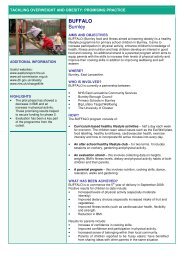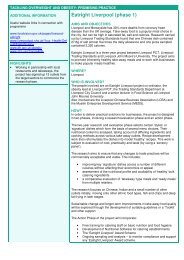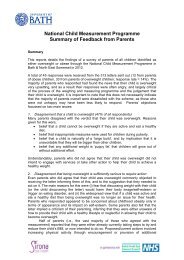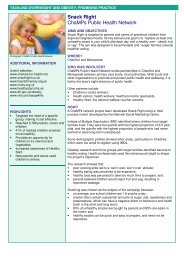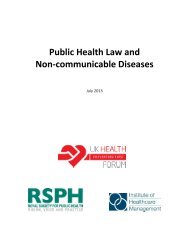The Challenge of Non-Communicable Diseases and Road Traffic ...
The Challenge of Non-Communicable Diseases and Road Traffic ...
The Challenge of Non-Communicable Diseases and Road Traffic ...
Create successful ePaper yourself
Turn your PDF publications into a flip-book with our unique Google optimized e-Paper software.
50 <strong>The</strong> <strong>Challenge</strong> <strong>of</strong> <strong>Non</strong>-communicable <strong>Diseases</strong> <strong>and</strong> <strong>Road</strong> <strong>Traffic</strong> Injuries in Sub-Saharan Africa<br />
BOX 6: Palliative <strong>and</strong> End-<strong>of</strong>-Life Care for AIDS,<br />
Cancer <strong>and</strong> Other Conditions<br />
Ug<strong>and</strong>a was the first country in Africa to include palliative<br />
care for chronically <strong>and</strong> terminally ill people as a<br />
priority within its National Health Policy in 1999 [337].<br />
It later participated in a joint project with four other<br />
countries – Botswana, Ethiopia, United Republic <strong>of</strong> Tanzania,<br />
<strong>and</strong> Zimbabwe – <strong>and</strong> WHO to improve the quality<br />
<strong>of</strong> life <strong>of</strong> AIDS <strong>and</strong> cancer patients by developing<br />
comprehensive palliative care programs with a community-health<br />
approach [339]. ART has not removed<br />
the need for palliative care. Around one-quarter to<br />
one-third <strong>of</strong> patients on ART can experience virological<br />
failure [340], <strong>and</strong> despite treatment, HIV-related cancers<br />
still develop, pain persists, <strong>and</strong> psychological <strong>and</strong><br />
spiritual need continues [341].<br />
Palliative or end-<strong>of</strong>-life care for people, irrespective<br />
<strong>of</strong> cause or condition, is scarce across the continent<br />
[342]. One study mapping such initiatives during 2003-<br />
05 found services in only 26 countries, <strong>and</strong> only in<br />
Ug<strong>and</strong>a, South Africa, Kenya, <strong>and</strong> Zimbabwe were they<br />
integrated into the existing health system [343]. <strong>The</strong><br />
nature <strong>of</strong> palliative-care needs <strong>and</strong> services in SSA reflects<br />
their development in the context <strong>of</strong> poverty <strong>and</strong><br />
AIDS, <strong>and</strong> include pain <strong>and</strong> symptom control, psychological<br />
support, <strong>and</strong> financial support for food, shelter,<br />
<strong>and</strong> funeral costs. Such a holistic approach is likely to<br />
be relevant for any life-threatening condition. <strong>The</strong> African<br />
Palliative Care Association advocates for palliative<br />
care to be an integral part <strong>of</strong> health systems (with service<br />
delivery models that span diseases), <strong>and</strong> promotes<br />
south-south collaboration [344].<br />
ger-term rehabilitation. Prompt emergency care can<br />
save lives, reduce the incidence <strong>of</strong> short-term disability<br />
<strong>and</strong> dramatically improve the long-term consequences<br />
for victims <strong>and</strong> their families [63].<br />
Setting up a single, nationwide telephone number<br />
for emergencies could help simplify matters [202],<br />
but one-third <strong>of</strong> SSA countries have no emergency<br />
number, <strong>and</strong> in another third there are multiple<br />
numbers which leads to inefficiency in dispatch<br />
[61]. Five countries have no ambulance services, <strong>and</strong><br />
in only nine countries do a reasonable proportion<br />
(50 percent or above) <strong>of</strong> injured patients reach hospital<br />
by ambulance.<br />
<strong>The</strong>re is a lack <strong>of</strong> resources for emergency response<br />
<strong>and</strong> care, especially in rural areas, <strong>and</strong> there is evidence<br />
<strong>of</strong> inconsistent pre-hospital care with most<br />
victims receiving minimal or no treatment in the<br />
field, <strong>and</strong> with hospitals <strong>and</strong> their staff not equipped<br />
to provide trauma care [345]. Even if admitted to a<br />
more sophisticated unit, disabilities are <strong>of</strong>ten inadequately<br />
assessed <strong>and</strong> rehabilitation services not in<br />
place for the vast majority <strong>of</strong> cases [346]. This situation<br />
results in a great loss <strong>of</strong> human potential. Ghana<br />
is probably not the only country in which 95 percent<br />
<strong>of</strong> disabled people have had no access to rehabilitative<br />
services [347]. A study in Nigeria found that<br />
RTIs resulted in disability for 29.1 percent <strong>of</strong> subjects,<br />
<strong>of</strong> whom 67.6 percent were unable to perform<br />
activities <strong>of</strong> daily living; 16.7 percent consequently<br />
lost their jobs, <strong>and</strong> 88.6 percent had a reduction in<br />
earnings [348].<br />
5.5. Strengthening Health Systems<br />
Countries’ ability to address chronic disease is<br />
limited by challenges in many aspects <strong>of</strong> health systems;<br />
notably, governance, financing, medicines <strong>and</strong><br />
technologies, service delivery, workforce, <strong>and</strong> information<br />
[349]. <strong>The</strong> challenges are not related just<br />
to the income or development level <strong>of</strong> the country.<br />
<strong>The</strong> shortcomings are hampering progress to communicable<br />
disease control <strong>and</strong> MDG targets, <strong>and</strong><br />
responding to NCD <strong>and</strong> RTI needs is likely to be<br />
even more challenging. Box 7 illustrates the manner<br />
in which countries as diverse as South Africa,<br />
Mauritius, Ghana, <strong>and</strong> Kenya are working to assess<br />
the health systems challenge posed by NCDs <strong>and</strong> to<br />
address them comprehensively.<br />
Governance<br />
A well-governed health system should have clear<br />
goals, participation <strong>of</strong> relevant stakeholders, transparent<br />
policies, oversight, <strong>and</strong> accountability [356].<br />
Weak governance impedes the work to improve<br />
health-system effectiveness <strong>and</strong> health outcomes,<br />
<strong>and</strong>, to some extent, may reflect the wider governance-environment<br />
in a country [357]. As already<br />
described in Section 6.1, in SSA relevant policies<br />
frequently do not exist or are poorly implemented,<br />
<strong>and</strong> regulatory frameworks are not in place or are<br />
weakly or not enforced. Performance management<br />
in African health systems is hindered by the absence<br />
<strong>of</strong> robust indicators <strong>of</strong> quality <strong>of</strong> services as<br />
experienced by citizens. Inadequate monitoring <strong>and</strong>





